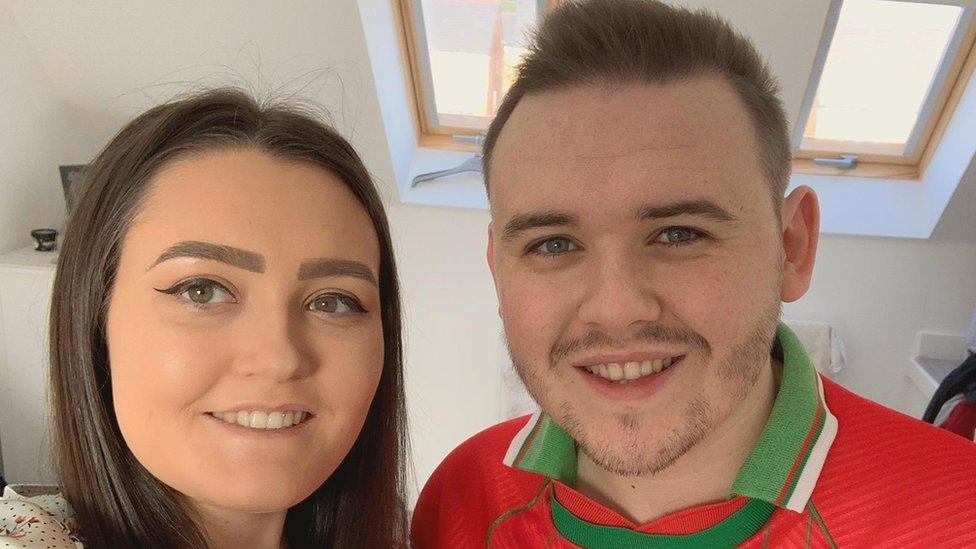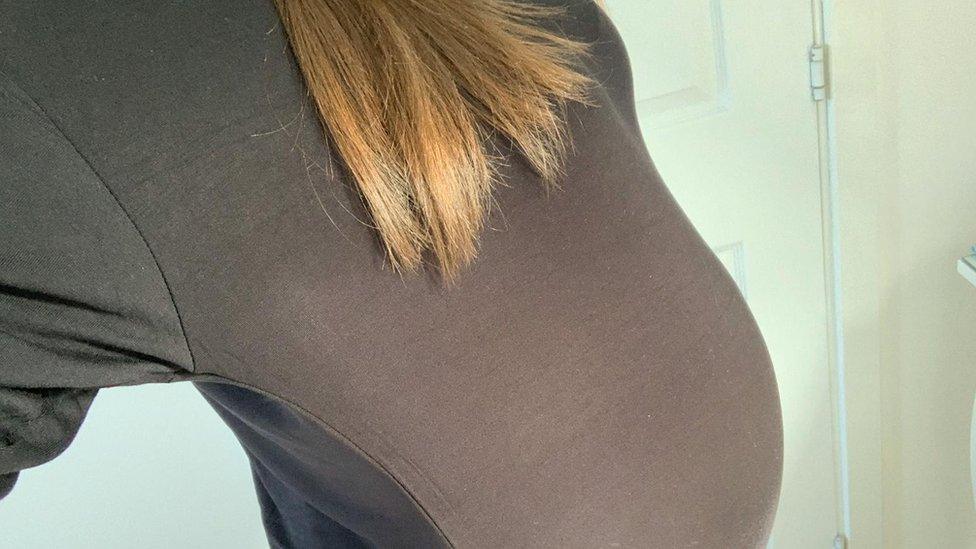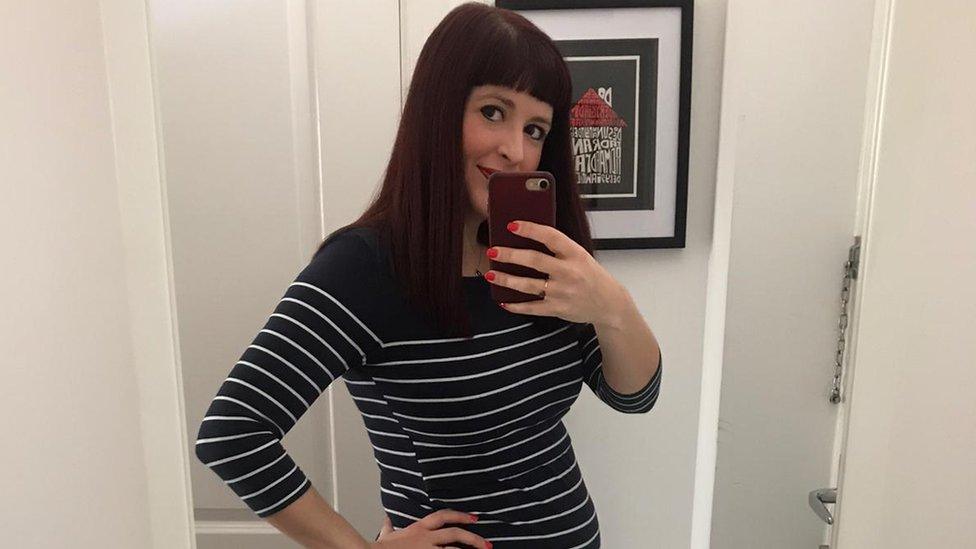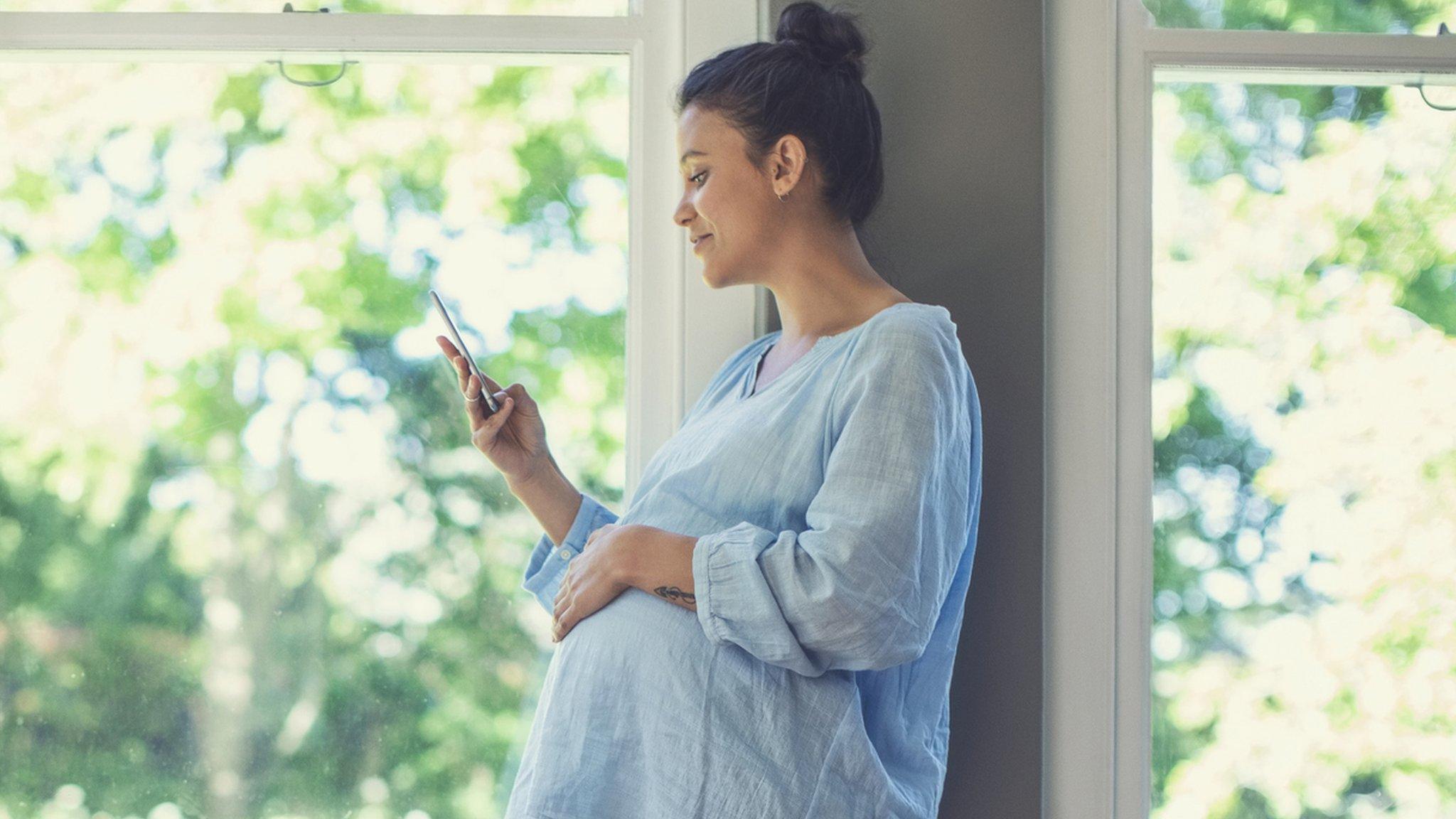Coronavirus: Pregnant women facing 'anxious, worrying time'
- Published
Elin Edwards says coronavirus has been a "bombshell" during her pregnancy
The coronavirus outbreak has left many people feeling trapped in their homes - but for pregnant women the situation has been particularly tough.
Expectant mothers have been isolated from their antenatal support and their loved ones.
The Royal College of Midwives in Wales says services are "under strain" and women may face "lessened choice" on birthing options.
So, what it is like preparing to give birth in such an unsettling time?
'I haven't seen my mum for two weeks'

Lucy and her fiancé Luke say restrictions have really affected them
First-time expectant mother Lucy, from Swansea, had her plans in motion ahead of her due date in May.
She had lined up antenatal classes, regularly saw a midwife, had hydrotherapy for her bad back and was making the most of seeing close family ahead of having her baby.
But last week pregnant women were urged to be stringent in following social distancing guidance.
Lucy, 24, said the restrictions changed everything for her.
"If something's wrong, the first person I would go to is my mother. And I haven't seen my mother now for about two weeks," she said.
"You can ring people and FaceTime them and things like that, but it's not the same as physically seeing them. And that's the part I find difficult."

Lucys says her fiancé's grandfather will not be able to see their baby for some time while he self-isolates
Lucy said she was worried about attending midwife appointments and going into hospital in case she contracted the virus.
And with tougher measures in maternity wards in some hospitals, pregnant women are only allowed one birthing partner and are restricted in who can visit them.
Lucy had planned for both her fiancé and her mother to be present at the birth, but that is no longer possible.
"What I'm scared of more than anything is just feeling like it's just us two and the baby and there's nobody else," she said.
'It's overwhelming'

Elin Edwards is worried about whether health services can cope
Elin Edwards, 35, from Cardiff, is expecting her first baby in June.
She said it was "overwhelming" to be away from friends and family.
"There is that strange feeling that you're going to be missing out now on that exciting phase," she said.
"You also don't know what the healthcare system is going to be coping with from week to week and how that impacts on maternity."
The director of the Royal College of Midwives in Wales, Helen Rogers, admitted "services will need to change" and that women may have "lessened choice" in how and where they give birth as "the service is under strain".
She urged any women with concerns to contact their community midwife.
"We don't want women to be worrying unnecessarily," she said.
"Midwives are prepared for pregnant women to be anxious and worried, we know this is an especially anxious and worrying time for them, so we would want women to contact us."
Pregnant GP: "There is a huge amount of anxiety"
Ms Rogers said pregnant women "shouldn't go off the radar".
"We need to make sure that your pregnancy health and the health of your baby continues to be monitored," she said.
But she said if a woman has signs of the virus she should not attend any clinics and should discuss a plan with her community midwife.
All of the seven health boards in Wales have put antenatal classes on hold following the tightened measures. They said resources would be put online.
The National Childbirth Trust has also had to stop running its 64 antenatal classes in Wales and is holding them online instead.
Laura Livingstone, who runs antenatal classes for pregnant women at an independent studio in Cardiff, said internet classes were a "good solution" but said it was hard for pregnant women who could not access the support networks they were used to.
Mrs Livingstone said: "There's a lot of free online support there.
"I would want to appeal to those new mums not to suffer alone, you don't need to, we are there for you.
"It's OK to have an emotional reaction to what's happening, what we're trying to reduce is ongoing anxiety to what's happening."

EASY STEPS: How to keep safe
A SIMPLE GUIDE: What are the symptoms?
CONTAINMENT: What it means to self-isolate
HEALTH MYTHS: The fake advice you should ignore
VIDEO: The 20-second hand wash

- Published24 March 2020

- Published17 March 2020
